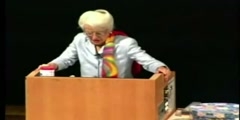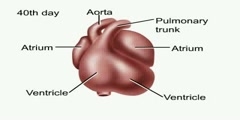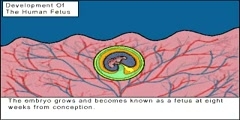Lec 13 - The Prince and the Palace: Human Made Divine on the Palatine Hill
"Lec 13 - The Prince and the Palace: Human Made Divine on the Palatine Hill" Roman Architecture (HSAR 252) Professor Kleiner investigates the major architectural commissions of the emperor Domitian, the last Flavian emperor. She begins with the Arch of Titus, erected after Titus' death by his brother Domitian on land previously occupied by Nero's Domus Transitoria. The Arch celebrated Titus' greatest accomplishment--the Flavian victory in the Jewish Wars--and may have served as Titus' tomb. Professor Kleiner also discusses the Stadium of Domitian, the shape of which is preserved in Rome's Piazza Navona. Her major focus is the vast Imperial Palace on the Palatine Hill designed by the architect Rabirius and featuring Domitian as dominus et deus (lord and god). Constructed from brick-faced concrete and revetted with multicolored imported marbles, this structure was divided into public and private wings, and was so magnificent that it served as the urban residence of all subsequent Roman emperors. The lecture concludes with the so-called Forum Transitorium, a narrow forum begun by Domitian and finished by his successor Nerva, which features a temple to Domitian's patron goddess Minerva and a series of decorative columnar bays that create a lively in-and-out undulation that heralds the beginning of a "baroque" phase in Roman architecture. 00:00 - Chapter 1. The Jewish Wars, the Flavian Dynasty, and the Arch of Titus 14:18 - Chapter 2. The Arch of Titus: Triumph and Tomb 23:25 - Chapter 3. Domitians Succession and Stadium (The Piazza Navona) 33:11 - Chapter 4. Domitian as Dominus et Deus in the Palatine Palace 46:14 - Chapter 5. Rabirius Architectural Innovations 01:02:06 - Chapter 6. The Forum Transitorium and Incipient Baroque Architecture Complete course materials are available at the Open Yale Courses website: http://open.yale.edu/courses This course was recorded in Spring 2009.
Video is embedded from external source so embedding is not available.
Video is embedded from external source so download is not available.
Here is the next lecture for this course
Bioethics Of Human Genetic Engineering - ...
06:53 | 31395 viewsHuman body versus the golden ratio
06:46 | 9521 viewsThe Human Family or Why Everyone Is Related
05:49 | 2887 viewsLec 2 -Hobbes: Authority, Human Rights an ...
42:56 | 3350 viewsHow to Sequence a Human Genome Mapping p ...
00:00 | 16418 viewsLec 17 - Bigger Is Better: The Baths of C ...
01:15:37 | 2991 viewsWhat makes human different? Interview wit ...
00:35 | 16254 viewsHuman evolution: interview with Ian Tatte ...
01:57 | 15523 viewsBerkley: General Human Anatomy. An Introd ...
01:30 | 12148 viewsThe human embryonic brain development
01:40 | 48306 viewsAdaptability of human body
02:53 | 11640 viewsNurseReview.Org - Animation of the Heart ...
00:40 | 27116 viewsPragmatic Bioinformatics: Human Genome in ...
04:12 | 10570 viewsCentrality of the earth and human
02:20 | 8650 viewsDevelopment of the Human Fetus
01:34 | 25164 viewsNo content is added to this lecture.
This video is a part of a lecture series from of Yale
Lecture list for this course
Lec 1 - Introduction to Roman Architecture
Lec 2 - It Takes a City: The Founding of Rome and the Beginnings of Urbanism in Italy
Lec 3 - Technology and Revolution in Roman Architecture
Lec 4 - Civic Life Interrupted: Nightmare and Destiny on August 24, A.D. 79
Lec 5 - Lifestyles of the Rich and Famous: Houses and Villas at Pompeii
Lec 6 - Habitats at Herculaneum and Early Roman Interior Decoration
Lec 7 - Gilding the Lily: Painting Palaces and Villas in the First Century A.D.
Lec 8 - Exploring Special Subjects on Pompeian Walls
Lec 9 - From Brick to Marble: Augustus Assembles Rome
Lec 10 - Accessing Afterlife: Tombs of Roman Aristocrats, Freedmen, and Slaves
Lecture 11 - Notorious Nero and His Amazing Architectural Legacy
Lec 12 - The Creation of an Icon: The Colosseum and Contemporary Architecture in Rome
Lec 14 - The Mother of All Forums: Civic Architecture in Rome under Trajan
Lec 15 - Rome and a Villa: Hadrian's Pantheon and Tivoli Retreat
Lec 16 - The Roman Way of Life and Death at Ostia, the Port of Rome
Lec 18 - Hometown Boy: Honoring an Emperor's Roots in Roman North Africa
Lec 19 - Baroque Extravaganzas: Rock Tombs, Fountains, and Sanctuaries in Jordan, Lebanon, and Libya
















